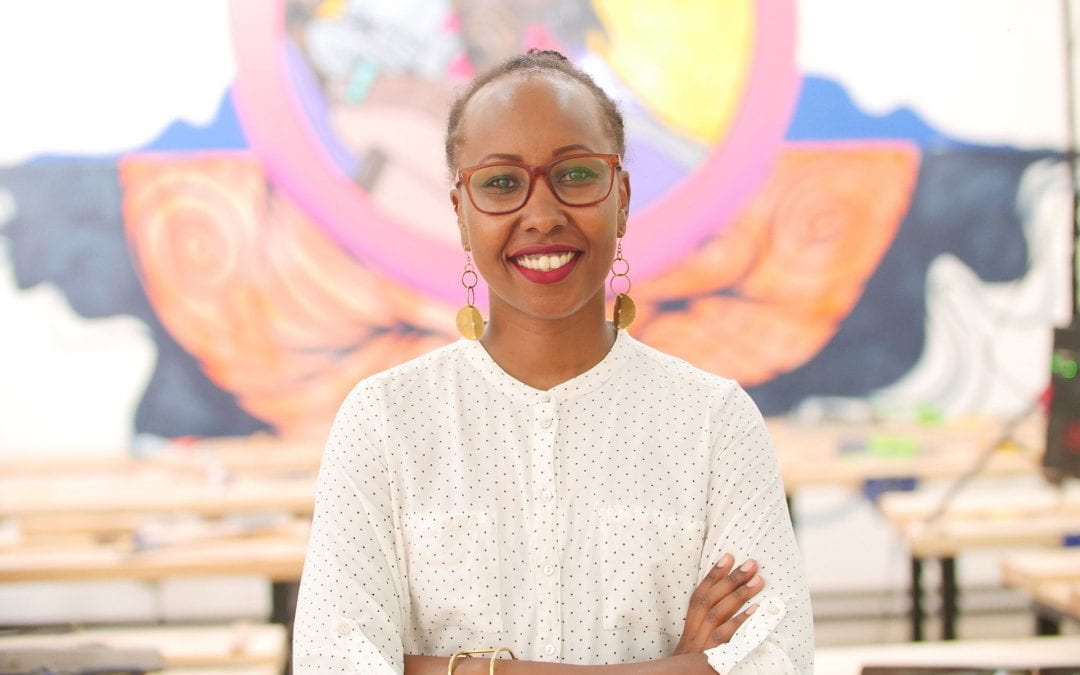Last Word: Taking a Seat in the Studio
By Tatu Gatere, B.Arch., cum laude, ’10
Photos this page: Russell Cothren
Tatu Gatere of Nairobi, Kenya, was a standout in her studio in Fay Jones School of Architecture and Design. Strengths in design and academics helped her and a male colleague win coveted internships in a prestigious architectural firm, where she planned to get a jump start on professional experience. A bad beginning provided an even more important life lesson.
I got my first professional job in the Washington, D.C., area through a placement that was awarded to the two top students in class, me and a (guy) friend of mine. We were at par in our knowledge and performance, yet when we got to the office, he was led to the drafting studio and I was led to the reception desk. It was good money, more than I had earned in America at that time, money that allowed me to pay for the rest of my school; it was also two dollars less per hour than my male fellow student was paid.
The first two weeks I worked as a receptionist killed a little part of me every day, killed me as I watched my fellow student getting the professional experience that would allow him to succeed in his career. I had worked as a waitress until then, didn’t love it but didn’t mind it either, and had been grateful for the chance to work, so this experience was personally confusing. I wanted to work but this felt wrong.
After two weeks I requested a sit down and asked my boss why he had chosen to put one student to work in the studio and why he had put me to work as a receptionist, an area of work that had nothing to do with my studies. He explained that he had put us in areas we were each good at. I was curious what he had seen in my transcript or teachers’ recommendations to make me well suited to be a secretary. When I asked, he blundered over his words, then quickly told me that he just needed me to fill the position until he got a receptionist and then he’d put me to drafting work. That was probably the first moment I realized that being one of the top students, and knowledgeable in my level of study, was invisible to him. He focused on the obvious: I was a good looking, well-mannered young woman, well suited to traditional women’s roles.
I thanked him for the job, expressed my gratitude for the opportunity, but let him know I would only work for one more week and would then leave to try to find proper professional placement. In my mind I knew that chances of another placement were slim, but I decided after many sleepless nights that the whole situation felt like a violation I couldn’t explain, and that my accepting the situation might set a precedent for other female students. So I waited and hoped the whole week, had constant stomach aches, anxiety and sleepless nights but nothing changed; I handed in my resignation on the Friday.

Tatu Gatere as an undergraduate (above and right), at work in studio. Below, Buildher trainees hone construction skills on site.

He was so shocked when I did. It’s like he never believed I would go through with it; I was after all an African foreign student in need of work. He sat me down and tried to explain his situation, that he only had that position available for me now. I mentioned that he could have been honest with the architecture faculty and let them know he only had a place for one student. That it was a waste for me to be investing in my education and then miss out on a critical path to successful course completion, and also that it was clear my being a girl student seemed to be a handicap in that office. When he denied this, I asked why the male student hadn’t been considered for the receptionist position; he fell silent.
After a long discussion it must have become clear that I would not change my mind, because he suddenly apologized for the whole thing and asked me to come back Monday to work as a draftsman. I wondered if he could see my nervousness throughout the conversation; I shivered the entire time.
I came to work on Monday fully prepared to resign if he couldn’t hire me as a draftsman, but he kept his word and retained me at two dollars less per hour than the male student. Three things were clear to me then. I thought the embarrassment of this story getting back to the faculty was what drove him to change. I thought that if I hadn’t been raised to speak my mind and value myself, I would never, ever have seen how clearly wrong the situation was or had the courage to stand up for myself. Not many Kenyan girls would do that today (I was 22 years old then). Finally, I knew that it had never occurred to him to pay me the same as the male student who had the same capacity, skills and knowledge as I did.
Today, I’m working to empower young women as co-founder of Buildher and COO at Orkidstudio in Nairobi, Kenya. We equip disadvantaged young women with accredited construction skills, leading to greater financial prosperity, changing male attitudes and promoting gender equity within the construction industry.


